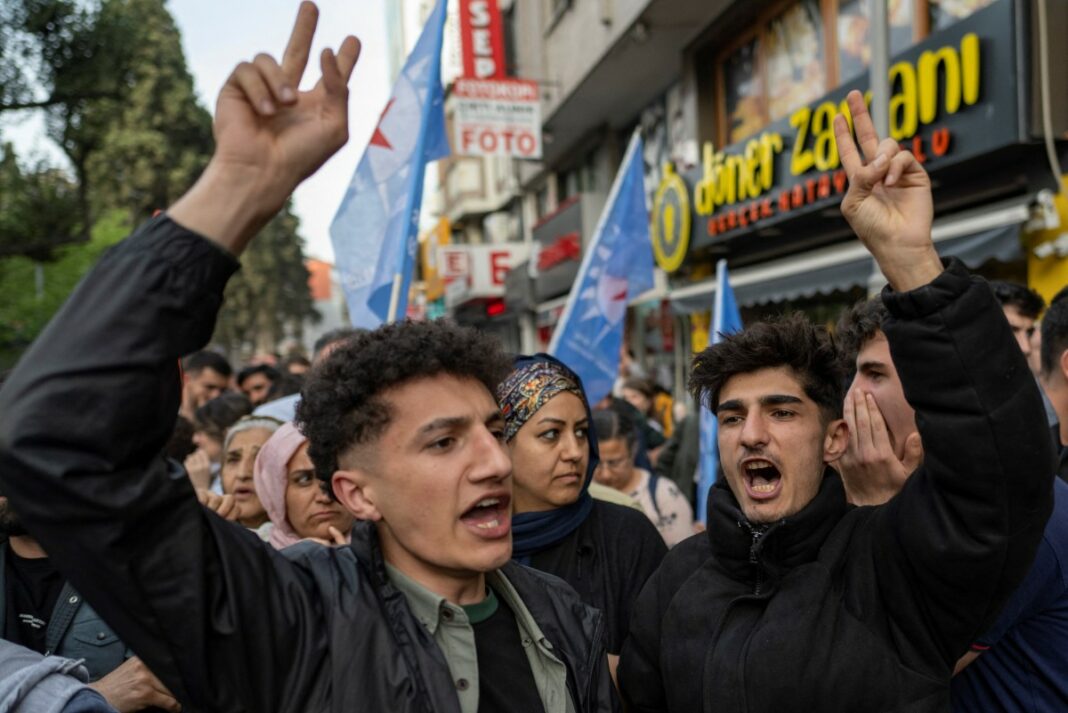Protests that have erupted across Turkey in response to a local electoral authority’s decision to annul the election victory of a pro-Kurdish candidate in Van and hand the mayoralty to the ruling party’s runner-up spread to other cities and met with police violence on Wednesday.
Abdullah Zeydan, representing the Peoples’ Equality and Democracy Party (DEM Party), had initially secured the post of mayor of the city of Van by a wide margin in local elections on Sunday.
He had garnered over 55 percent of the vote, but the regional electoral commission said he was ineligible to stand for election, handing city hall to a candidate from President Recep Tayyip Erdoğan’s ruling Justice and Development Party (AKP) who received only 27 percent of the vote.
Their decision followed the last-minute reversal of a court verdict that had restored his right to run for office.
Zeydan, who had been elected on the pro-Kurdish Peoples’ Democratic Party (HDP) (now DEM) ticket in 2015, was arrested in 2016 after criticizing the Turkish army’s air campaign against outlawed Kurdish militants in the Kurdish-majority southeast.
Violent protests against his ouster lasted throughout the night in Van province, which sits on Turkey’s eastern border with Iran.
All eyes are on the Kurdish city of Van following a night of state violence against protesters, after authorities annulled a sweeping local election victory by the pro-Kurdish DEM Party and awarded the mandate to the ruling party's candidate.
Serhildan jiyane, berxwedan jiyane!… pic.twitter.com/PqfjcMNf0D
— Samira Ghaderi (@Samira_Ghaderi) April 3, 2024
On Wednesday, despite a ban on public gatherings, large crowds gathered in Van, İstanbul and Diyarbakır, expressing their opposition to the reversal of the election results and asserting the validity of the election.
Police interventions marked the gathering of DEM Party officials along with main opposition Republican People’s Party (CHP) and Workers’ Party of Turkey (TİP) deputies, whose march encountered police barriers and, in some instances, tear gas and water cannons aimed at dispersing the crowds.
The DEM Party and its supporters, including the CHP and TİP, protested the election authority’s decision in a march in Van, which was dispersed by police using tear gas.
Participants in the march included DEM Party co-chairs Tülay Hatimoğulları and Tuncer Bakırhan, deputy parliamentary group leader Gülistan Kılıç Koçyiğit, deputies Sırrı Sakık, MYK members, DEM Party Women’s Council spokesperson Halide Türkoğlu, DBP co-chair Keskin Bayındır, and Youth Council Co-Speaker Edanur İbrahimoğlu, Van Co-Mayors Neslihan Şedal and Abdullah Zeydan, Leyla Zana, Başak Demirtaş (wife of former jailed Kurdish leader Selahattin Demirtaş), CHP deputy Sezgin Tanrıkulu and the CHP delegation, TİP chairman Erkan Baş and lawmaker Ahmet Şık and Labor Party chairman Seyit Aslan.
“Once again there was chaos on the streets of Van. The press statement planned for 12:00 [local time] was blocked on the grounds of a ban by the governor. The delegation, which included the co-chairs of the DEM Party, the CHP delegation, the TİP chairman and regional deputies, was attacked with tear gas,” journalist Ruşen Takva reported.
Moreover, Kurds protesting the decision continued their demonstrations in the streets of Van, being attacked with tear gas and percussion bombs all over the city.
Following the march, the co-chair of the DEM Party, Bakırhan, gave a speech in front of thousands at Feqiyê Teyran Park in Van.
He emphasized the importance of the city for the Kurdish community and promised to resist what he described as a “political and legal coup” against the will of the Kurdish people.
Leyla Zana, a prominent Kurdish politician, addressed President Erdoğan directly and called on him to respect the decision of Kurdish voters.
At the same time, protests and demonstrations took place in Kurdish cities and major urban centers such as İstanbul and Diyarbakır.
Çağlayan Adliyesi'nde Van darbesini protesto etmek isteyen avukatlara şiddetli saldırı.. Avukatlar, adliyeden işkenceyle gözaltına alındı!pic.twitter.com/SsonwRfljK
— Emre Orman 🇵🇸🔻 (@eemreorman) April 3, 2024
In İstanbul, several bar associations intended to read out a statement in front of the Çağlayan Courthouse but were prevented from doing so by the police.
Three lawyers were injured and at least 10 others were detained in clashes between the lawyers and the police.
The Turkish Interior Ministry reported the detention of 89 people for unauthorized protests and expressions of support for the Kurdistan Workers’ Party (PKK), which is designated as a terrorist organization by Turkey and its Western allies.
Journalists face assaults and threats
Journalists reporting on the situation have faced assaults and threats. Reporters in the field have been subjected to various forms of police violence including tear gas, plastic bullets and water cannons.
Muhammed Şakir, a cameraman for the Rudaw news website, was struck by a tear gas canister while covering the protests in Van.
Rudaw's cameraman Mohammed Shaker was hit by a teargas cannister while covering the protests underway in Van against a Turkish electoral body decision to prevent the pro-Kurdish DEM Party candidate from assuming his role as mayor, and replacing him with an AKP candidate. pic.twitter.com/bcqY6ba85x
— Rudaw English (@RudawEnglish) April 3, 2024
Adding to the physical dangers in the streets, journalists have also reported being the targets of threats and harassment for their coverage of human rights violations during the protests. Medine Mamedoğlu and Ruşen Takva were among those who shared their experiences of harassment and threats on social media platforms.
A particularly alarming incident involved journalist Ece Üner, who received a death threat referencing “Beyaz Toros” — a symbol of enforced disappearances in the 1990s in Turkey, where individuals were abducted by unidentified assailants in white Renault Taurus cars, often never to be seen again.
Many also reported an increase in racist comments on social media. Responses to tweets reporting on the violence against the protesters included hateful remarks against Kurds.
The protests are continuing. Participants and leading representatives of various parties promise to demonstrate in Van and throughout Turkey until the decision is reversed and democracy is respected.

